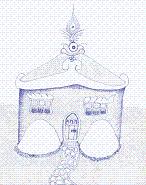Be Kind! Share with your Team, with your Family, with your Buddies!
Click The Button Now & Like This On Your Facebook Page!
Monday, October 14, 2013
EcoSmart Bamboo Chopping Boards The Genuine Deal
The delightful gadgets and containers that are now the basics for the kitchen, often come with a price to the environment. Plastic bowls require nonrenewable fuel sources to produce so do plastic chopping board. Once the blocks become marred and fit for the trash, they'll stay whole in the garbage dump for decades. The pliable cutting boards may look impressive and enter the picture a variety of fun colors, but all that has a price. The environment pays.
You might think about wooden boards as a worthwhile alternative, but think they cost far too much. You can have an attractive chopping board that is environment-friendly and still won't violate your resources. Many professionals class bamboo with hard woods, despite the fact that it's basically a grass. That's because it has all the benefits of wood, without the substantial price. Bamboo slicing boards originated from a green source, just as hard wood does. The eco sensitive bamboo cutting boards also are friendly to your knives, similar to wood.
While bamboo cutting boards last a long time when treated properly, eventually, much like a wood cutting board, you'll want something new for your kitchen and deal with the bamboo. Unlike plastics that may remain in the landfill unscathed by bacteria or degrade to harmful chemicals, you won't need to bother with your ecosensitive exotic bamboo cutting boards. You can toss the board into the compost heap and it decomposes to help create superb soil for the garden. There are no damaging chemicals created as this occurs.
Bamboo, like wood, originates from a renewable source. However, a tree may take up to thirty years to mature before it's ready to cut. Bamboo, however, takes between three and seven years to mature. Unlike harvesting trees, which kills them, harvesting bamboo doesn't harm the plant. It remains to grow and produce more bamboo for flooring, clothing and reducing boards.
Bamboo has an extensive and deep root system that helps prevent land erosion. The root system is the reason you can harvest the bamboo without killing the plant, since proper harvesting allows new shoots to grow from the roots. The plant also helps control greenhouse gasses far better than even wood does. It not only absorbs carbon dioxide, it then releases oxygen. While hardwood does this too, bamboo releases 35 percent more than the hardwood does.
The bamboo used to make bamboo cutting boards doesn't require any pesticides or fertilizer. Unlike many other agricultural products, bamboo contains its own natural pesticide, which isn't harmful to the environment or people. There's also no waste with bamboo. You can use every section of the plant to make everything from cutting boards to clothing. The fibers are strong and it doesn't warp as easily as wood does.
Bamboo reducing boards have more to offer than just eco sensibility. They have a natural anti-bacterial and anti-microbial property that helps eliminate potential toxins. They're somewhat harder than wood, but still won't dull your knives like plastic, stone or glass. While these are all good reasons for the dramatically increasing popularity of bamboo cutting boards, the main reason is the boards' rich chic appearance. Bamboo cutting boards are much more than just work horses for the kitchen; they're a decorating accessory.















